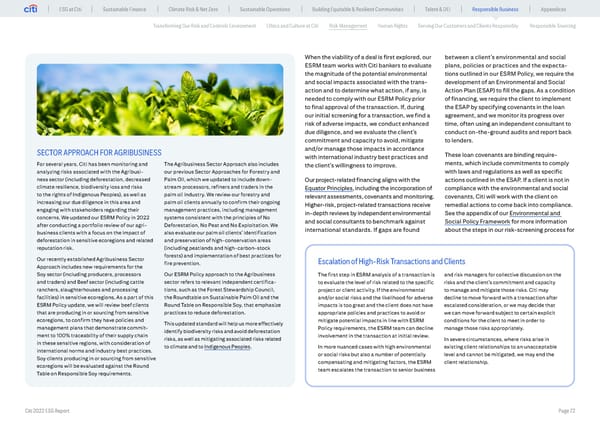ESG at Citi Sustainable Finance Climate Risk & Net Zero Sustainable Operations Building Equitable & Resilient Communities Talent & DEI Responsible Business Appendices Transforming Our Risk and Controls Environment Ethics and Culture at Citi Risk Management Human Rights Serving Our Customers and Clients Responsibly Responsible Sourcing When the viability of a deal is first explored, our between a client’s environmental and social ESRM team works with Citi bankers to evaluate plans, policies or practices and the expecta- the magnitude of the potential environmental tions outlined in our ESRM Policy, we require the and social impacts associated with the trans- development of an Environmental and Social action and to determine what action, if any, is Action Plan (ESAP) to fill the gaps. As a condition needed to comply with our ESRM Policy prior of financing, we require the client to implement to final approval of the transaction. If, during the ESAP by specifying covenants in the loan our initial screening for a transaction, we find a agreement, and we monitor its progress over risk of adverse impacts, we conduct enhanced time, often using an independent consultant to due diligence, and we evaluate the client’s conduct on-the-ground audits and report back commitment and capacity to avoid, mitigate to lenders. SECTOR APPROACH FOR AGRIBUSINESS and/or manage those impacts in accordance with international industry best practices and These loan covenants are binding require- For several years, Citi has been monitoring and The Agribusiness Sector Approach also includes the client’s willingness to improve. ments, which include commitments to comply analyzing risks associated with the Agribusi- our previous Sector Approaches for Forestry and with laws and regulations as well as specific ness sector (including deforestation, decreased Palm Oil, which we updated to include down- Our project-related financing aligns with the actions outlined in the ESAP. If a client is not in climate resilience, biodiversity loss and risks stream processors, refiners and traders in the Equator Principles, including the incorporation of compliance with the environmental and social to the rights of Indigenous Peoples), as well as palm oil industry. We review our forestry and relevant assessments, covenants and monitoring. covenants, Citi will work with the client on increasing our due diligence in this area and palm oil clients annually to confirm their ongoing Higher-risk, project-related transactions receive remedial actions to come back into compliance. engaging with stakeholders regarding their management practices, including management in-depth reviews by independent environmental See the appendix of our Environmental and concerns. We updated our ESRM Policy in 2022 systems consistent with the principles of No and social consultants to benchmark against Social Policy Framework for more information after conducting a portfolio review of our agri- Deforestation, No Peat and No Exploitation. We international standards. If gaps are found about the steps in our risk-screening process for business clients with a focus on the impact of also evaluate our palm oil clients’ identification deforestation in sensitive ecoregions and related and preservation of high-conservation areas reputation risk. (including peatlands and high-carbon-stock Our recently established Agribusiness Sector forests) and implementation of best practices for Escalation of High-Risk Transactions and Clients Approach includes new requirements for the fire prevention. Soy sector (including producers, processors Our ESRM Policy approach to the Agribusiness The first step in ESRM analysis of a transaction is and risk managers for collective discussion on the and traders) and Beef sector (including cattle sector refers to relevant independent certifica- to evaluate the level of risk related to the specific risks and the client’s commitment and capacity ranchers, slaughterhouses and processing tions, such as the Forest Stewardship Council, project or client activity. If the environmental to manage and mitigate those risks. Citi may facilities) in sensitive ecoregions. As a part of this the Roundtable on Sustainable Palm Oil and the and/or social risks and the likelihood for adverse decline to move forward with a transaction after ESRM Policy update, we will review beef clients Round Table on Responsible Soy, that emphasize impacts is too great and the client does not have escalated consideration, or we may decide that that are producing in or sourcing from sensitive practices to reduce deforestation. appropriate policies and practices to avoid or we can move forward subject to certain explicit ecoregions, to confirm they have policies and This updated standard will help us more effectively mitigate potential impacts in line with ESRM conditions for the client to meet in order to management plans that demonstrate commit- identify biodiversity risks and avoid deforestation Policy requirements, the ESRM team can decline manage those risks appropriately. ment to 100% traceability of their supply chain risks, as well as mitigating associated risks related involvement in the transaction at initial review. In severe circumstances, where risks arise in in these sensitive regions, with consideration of to climate and to Indigenous Peoples. In more nuanced cases with high environmental existing client relationships to an unacceptable international norms and industry best practices. or social risks but also a number of potentially level and cannot be mitigated, we may end the Soy clients producing in or sourcing from sensitive compensating and mitigating factors, the ESRM client relationship. ecoregions will be evaluated against the Round team escalates the transaction to senior business Table on Responsible Soy requirements. Citi 2022 ESG Report Page 72
 Global ESG Report 2022 Citi Bookmarked Page 71 Page 73
Global ESG Report 2022 Citi Bookmarked Page 71 Page 73